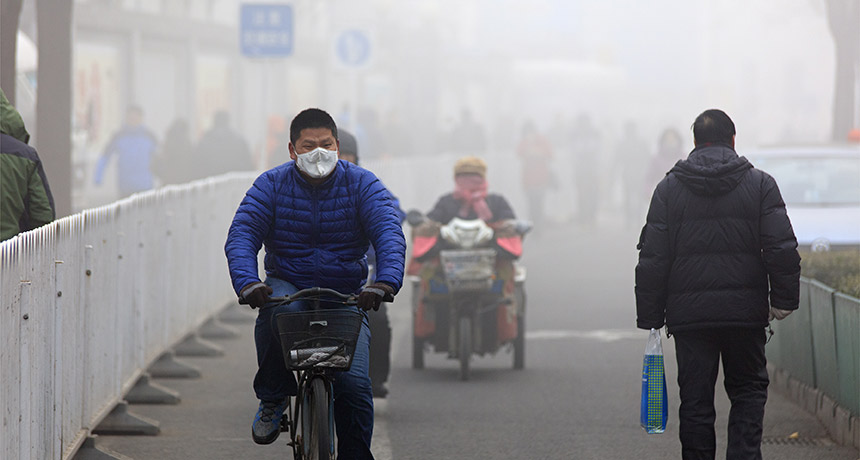Chinese ‘tweets’ hint that happiness drops as air pollution rises
Scientists analyzed air quality data along with more than 210 million social media posts

SMOGGY SPIRITS Air pollution is a public health threat. It also contributes to a decline in people’s happiness, a new study shows.
Testing/Shutterstock
Air pollution is recognized as a public health threat in China, linked to heart disease, cancer, cognitive decline and even risky behavior. Now a study analyzing air quality data and social media posts on China’s version of Twitter suggests that poor air quality may also harm people’s sense of well-being.
“The higher the levels of air pollution in Chinese cities, the lower people’s happiness,” says Siqi Zheng, an environmental and urban economist at MIT and coauthor of the study published January 21 in Nature Human Behaviour.
To reach that conclusion, Zheng and colleagues first developed a daily “happiness index” that looked at a population’s overall mood in each of 144 Chinese cities. The researchers gauged these moods using two word analysis programs on a total of 210 million social media posts appearing in March to November 2014 on the platform Sina Weibo.
The researchers then compared their happiness findings with daily levels of airborne particles measuring less than 2.5 micrometers in diameter, or PM2.5, as reported by authorities. The analysis revealed a link between poor air quality and lower overall mood. This finding held true even after eliminating posts containing words that explicitly referred to pollution.
The researchers were also able to show how other variables, such as the weather or the day of the week, affected a population’s overall mood. People expressed more happiness on weekends and on holidays — no surprise there. Posts also reflected less happiness when the weather became hot. And when high air pollution coincided with weekends, happiness plummeted.
“The negative impact of air pollution on happiness is 55 percent larger on weekends than that on weekdays,” Zheng says.
China’s cities have been challenged for decades by high air pollution levels, with its cities routinely exceeding the World Health Organization’s recommended PM2.5 limit of a daily mean of 25 micrograms per cubic meter of air.
The study estimates that, for every 10 micrograms per cubic meter increase in PM2.5, there is a decrease in happiness by the same amount as when temperatures rise about half a centigrade beyond what people consider comfortable (calculated at 17.5° Celsius in this study), Zheng says.
When pollution rose, happiness declined more in women than in men, though the study did not reveal why that was. Residents in China’s cleanest cities were also more likely to express unhappiness when air quality worsened. That was true, too, in the country’s most polluted cities, where residents have to contend with pollution mitigation policies like school closures or vehicle bans on the road.
“This work looks really solid,” says Chris Danforth, an applied mathematician at the University of Vermont in Burlington. He and colleague Peter Dodds created a computer program called the Hedonometer that similarly analyzes Twitter posts to measure the happiness of large populations.
Danforth, Dodds and colleagues used their tool to analyze the mood effects of being in nature. They found that people use fewer negative words associated with analytical thinking, such as “no,” “don’t” and “never,” and more positive words like “beautiful,” “happy” and “fun.” That finding, posted online in July 2018 at arXiv.org, suggests that people are getting out of their heads and into their surroundings, Danforth says.
Neither of the word analysis programs that Zheng and her team used reveal actual words that people used in their social media posts. So it’s hard to pinpoint exactly what’s going on, Danforth says.
Even without that deeper analysis, Zheng is hoping to develop a tool that would display fluctuating moods about air quality in real time. That could lead local policymakers to respond more quickly to spikes in air pollution, Zheng says.







